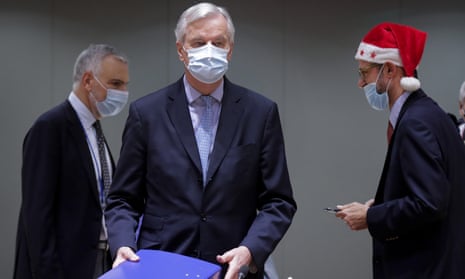Questions about how the full details of the Brexit deal would be received, and warnings of the negotiations that will continue after its implementation, tempered widespread relief in Europe that a last-ditch agreement had been reached.
Many commentators also wondered how Britain would negotiate the reality of life outside the European Union after years of unsettled argument even within the pro-Brexit camp about the country’s strategic direction.
Le Monde said the country was now facing a dilemma from over half a century ago. “The United Kingdom finds itself once again facing a question that was never resolved after 1945: its place in the world,” wrote Philippe Bernard. “Its like Back to the Future, from the 1950s.
“While Germany and France launched themselves into building Europe, the British refused to join this project, too limited for their ambitions and initiated by two countries they considered, unlike themselves, losers of the war.”
On the day after Christmas, officials in Brussels and the capitals of the EU states began scrutinising more than 1,000 pages that made up the deal, as did people whose livelihood may be on the line.
“The only certainty today is that we need to find, during the transition period, more deals within the deal,” said Frédéric Cuvillier, mayor of the northern French city of Boulogne-sur-Mer, which has a large fishing industry.
The agreement left much obscured, he warned. “Relief for our fishermen, but what will be the impact on stocks? Who, for example, will be handling the controls? And over what time?” he told Europe 1 radio.
Despite challenges from him and others unhappy with the agreement, it is widely expected that the deal will be “provisionally applied” at the end of the year by the EU in order to avoid a no-deal outcome, with MEPs voting later in January. The House of Commons will be recalled and hold a vote on the new treaty on 30 December.
But Britain and Europe should expect years of continued wrangling over trade, warned Björn Finke in Germany’s Süddeutsche Zeitung.
“Those who think the Brexit drama comes to an end with this deal will be bitterly disappointed,” he wrote. “In the coming years and decades, there will be plenty of reasons to call on the arbitration bodies envisioned in the deal, likely under the threat of tariffs. The drama will carry on. Sadly.”
The triumphalism that marked Boris Johnson’s presentation of the deal at home was largely absent in Europe, perhaps because many there felt that Britain had not emerged with the clear victory its leader claimed.
That may be one of the few opinions they share with hardline Brexiters in Britain, who are now poring over the deal to decide if they will back it.

French Europe minister Clément Beaune said it was a “good agreement” and stressed that the EU had not accepted a deal “at all costs”. Irish PM Micheál Martin welcomed it as representing the “least bad version of Brexit possible”.
Unbound by diplomatic niceties, France’s Libération newspaper was more blunt, describing the agreement as offering only “a facade of commercial freedom for the UK”, while committing London to maintaining standards on the environment, workers’ rights and climate change.
From Spain to Germany, there was praise for the role European unity played in achieving what Süddeutsche Zeitung also considered a “relatively advantageous deal”.
“It averts tariffs for the goods trade, which is especially important for the EU since its states export a lot more to Great Britain than they import. The United Kingdom, meanwhile, has a trade surplus in services. But here the deal barely lessens the complications that come with an end of EU membership.”
For Spain’s El País, there was a particular historic significance in how Germany and France shrugged off last-minute attempts by Britain to fracture their solidarity, including refusing Johnson’s request for individual phone calls with Emmanuel Macron and Angela Merkel at a critical point in negotiations.
“Bells are tolling for the ‘divide and conquer’ tactics London used for centuries to block the emergence of a dominant European power,” the paper said.
Der Spiegel’s Markus Becker suggested that the realities of Brexit would deal a heavy blow to the British exceptionalism that helped drive the departure from the EU. “Many politicians and citizens in Great Britain do not perceive themselves to be Europeans among many other Europeans,” he said. “And Great Britain does not think of itself as one European country among many, but a very special or even chosen one.
“Of course, not all Brits think like that. But sadly they are not the ones currently in charge. That is why their country’s departure from the EU is not an unreasonable development.
“The EU will be freer to take the steps it needs to take in order to assert itself against the USA and China – because it is running out of time to do so. Great Britain, on the other hand, might need Brexit to realise how small the bit part it will play on the world stage will really be.”
Some on the continent expressed hope that, with Brexit complete, the ideological impetus for anti-European Union sentiment would dissipate, and a rebuilding of close ties could commence.
José Ignacio Torreblanca, senior fellow at the European Council on Foreign Relations, argued that Brexit marks not only Britain’s lowest ebb, but the “most damaging, and irreversible” outcome of the waves of populist sentiment that swept through many western democracies in 2016.
Writing in El Mundo, he painted a picture of an out-of-touch Britain obsessed by past glories while the rest of the world got to grips with 5G and artificial intelligence: “While the US is shaking off Trump’s 2016 win, to restore their role, influence and image in the rest of the world, Britain is consumed by the eccentric plan of the conservative elite to return to exerting [global] influence from a position of splendid isolation.”
